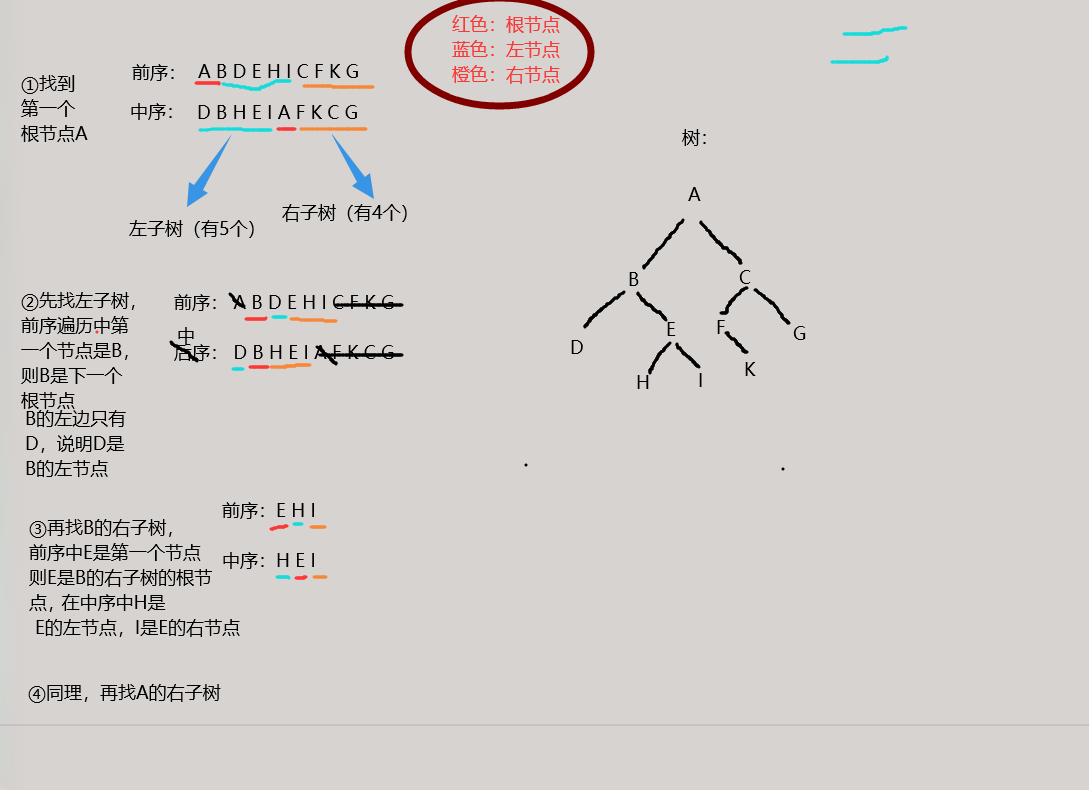重构二叉树 + 输出 (层序遍历、其他遍历)
一、题型
输入是两个一维数组,分别表示树的前/中/后序遍历和前/中/后序遍历结果,输出是输出二叉树或层序遍历或其他。
二、分类
1. 输入:前序+中序 输出
2. 输入:前序+后序 输出
3. 输入:中序+后序 输出
三、重构二叉树
1. 重构二叉树思路:前序遍历的第一个节点即为根节点,在前序遍历中找到根节点后,再在中序遍历中找到根节点的位置,根节点的左边所有点就是它的左子树,右边所有节点就是它的右子树。统计左子树有几个点,然后在前序遍历数组中根节点的后面找几个点,右子树也一样。然后再在左子树和右子树中寻找下一个根节点,重复上面操作。结合下面例子来理解一下。
2.举例(前序 + 中序)
给出前序遍历数组:前序: A B D E H I C F K G
给出中序遍历数组:中序: D B H E I A F K C G
首先前序遍历的第一个节点A就是根节点,在中序遍历中找到A的位置,下标为5,则A的左边5个节点即为左子树,右边4个节点即为右子树。
先递归A的左子树,A的左子树有5个,则在前序遍历A的后面5个范围内找,第一个点是B,则B是左子树的第一个根节点,又在中序中找到B的位置,为1,
B的左边只有D,则D是B的左节点,B的右边有三个,则递归B的右子树。B的右边有3个,则在前序遍历中找E H I 三个点,E先,则E是B的右节点。继续重复。。。。
如下图中的操作。

3. 重构二叉树的代码框架
前序 + 中序:
#include <bit/sdc++.h>
using namespace std;
int Pre[31],In[31];
typedef struct BinaryTree{
int key;
BinaryTree *left;
BinaryTree *right;
}BinaryTree,*Tree;
//注:另外命名一个*Tree,后面队列那里要用到
//找到后序遍历的根节点在中序遍历的位置,记为r
int FindRootInInoder(int begin,int end,int key){
for(int i=begin;i<end;i++){
if(key==In[i])
return i;
}
}
/**
重构二叉树:前序+中序
**/
BinaryTree *GetBinaryTree(int pbegin,int pend,int ibegin,int iend){
// if(pbegin>=pend || ibegin>=iend){
// return NULL;
// }
BinaryTree *Root = new struct BinaryTree;//新建一颗树
*Root = {Pre[pbegin],NULL,NULL}; //前序遍历的第一个值即为根节点。注意:Root前要有*否则报错
int r = FindRootInInoder(ibegin,iend,Pre[pbegin]);
//递归求左子树、右子树
int count=r-ibegin; //左子树节点的个数,有几个就在前序遍历中从pbegin开始找几个
if(r!=ibegin) //要写!!!!否则会出现-1情况,会出现段错误
//位置看图去对应,如上图,A为根节点,左子树为:前序是2~(0+5) 中序是0~5-1
Root->left = GetBinaryTree(pbegin+1, pbegin+count, ibegin, r-1);
if(r!=iend)
Root->right = GetBinaryTree(pbegin+count+1, pend, r+1, iend);
return Root;
}
int main(){
int n;
cin>>n;
for(int i=0;i<n;i++)
cin>>Pre[i];
for(int i=0;i<n;i++)
cin>>In[i];
Tree root = GetBinaryTree(0,n-1,0,n-1);//注意:此处是n-1索引
Sequence(root);
return 0;
}
中序 + 后序:
思路、代码框架都一样,只不过需要改掉下面①②③④个部分
#include <bit/sdc++.h> using namespace std; int Post[31],In[31]; typedef struct BinaryTree{ int key; BinaryTree *left; BinaryTree *right; }BinaryTree,*Tree; //注:另外命名一个*Tree,后面队列那里要用到 //找到后序遍历的根节点在中序遍历的位置,记为r int FindRootInInoder(int begin,int end,int key){ for(int i=begin;i<end;i++){ if(key==In[i]) return i; } } /** 重构二叉树:后序+中序 **/ BinaryTree *GetBinaryTree(int pbegin,int pend,int ibegin,int iend){ // if(pbegin>=pend || ibegin>=iend){ // return NULL; // } BinaryTree *Root = new struct BinaryTree;//新建一颗树 *Root = {Post[pend],NULL,NULL}; //后序遍历的最后一个值即为根节点。注意:Root前要有*否则报错 ① int r = FindRootInInoder(ibegin,iend,Post[pend]); ② //递归求左子树、右子树 int count=r-ibegin; //左子树节点的个数,有几个就在后序遍历中从pbegin开始找几个 if(r!=ibegin) Root->left = GetBinaryTree(pbegin,pbegin+count-1,ibegin,r-1); ③ if(r!=iend) Root->right = GetBinaryTree(pbegin+count,pend-1,r+1,iend); ④ return Root; } int main(){ int n; cin>>n; for(int i=0;i<n;i++) cin>>Post[i]; for(int i=0;i<n;i++) cin>>In[i]; Tree root = GetBinaryTree(0,n-1,0,n-1);//注意:此处是n-1索引 Sequence(root); return 0; }
前序 + 后序:也一样,略。
四、例子
给定一棵二叉树的后序遍历和中序遍历,请你输出其层序遍历的序列。这里假设键值都是互不相等的正整数。
输入格式:
输入第一行给出一个正整数N(≤30),是二叉树中结点的个数。第二行给出其后序遍历序列。第三行给出其中序遍历序列。数字间以空格分隔。
输出格式:
在一行中输出该树的层序遍历的序列。数字间以1个空格分隔,行首尾不得有多余空格。
输入样例:
7
2 3 1 5 7 6 4
1 2 3 4 5 6 7
输出样例:
4 1 6 3 5 7 2
AC代码:
#include <bits/stdc++.h> using namespace std; int Post[31],In[31]; typedef struct BinaryTree{ int key; BinaryTree *left; BinaryTree *right; }BinaryTree,*Tree; //注:另外命名一个*Tree,后面队列那里要用到 //找到后序遍历的根节点在中序遍历的位置,记为r int FindRootInInoder(int begin,int end,int key){ for(int i=begin;i<end;i++){ if(key==In[i]) return i; } } /** 重构二叉树:后序+中序 **/ BinaryTree *GetBinaryTree(int pbegin,int pend,int ibegin,int iend){ // if(pbegin>=pend || ibegin>=iend){ // return NULL; // } BinaryTree *Root = new struct BinaryTree;//新建一颗树 *Root = {Post[pend],NULL,NULL}; //后序遍历的最后一个值即为根节点。注意:Root前要有*否则报错 int r = FindRootInInoder(ibegin,iend,Post[pend]); //递归求左子树、右子树 int count=r-ibegin; //左子树节点的个数,有几个就在后序遍历中从pbegin开始找几个 if(r!=ibegin) Root->left = GetBinaryTree(pbegin,pbegin+count-1,ibegin,r-1); if(r!=iend) Root->right = GetBinaryTree(pbegin+count,pend-1,r+1,iend); return Root; } /** 输出层序遍历(常用队列实现) **/ void Sequence(Tree root) { queue<Tree> t; if(root) t.push(root); while(!t.empty()) { root=t.front(); t.pop(); cout<<root->key; if(root->left) t.push(root->left); if(root->right) t.push(root->right); if(!t.empty()) cout<<" "; } } int main(){ int n; cin>>n; for(int i=0;i<n;i++) cin>>Post[i]; for(int i=0;i<n;i++) cin>>In[i]; Tree root = GetBinaryTree(0,n-1,0,n-1);//注意:此处是n-1索引 Sequence(root); return 0; }
写得有点匆忙,有错误欢迎指正。


 浙公网安备 33010602011771号
浙公网安备 33010602011771号